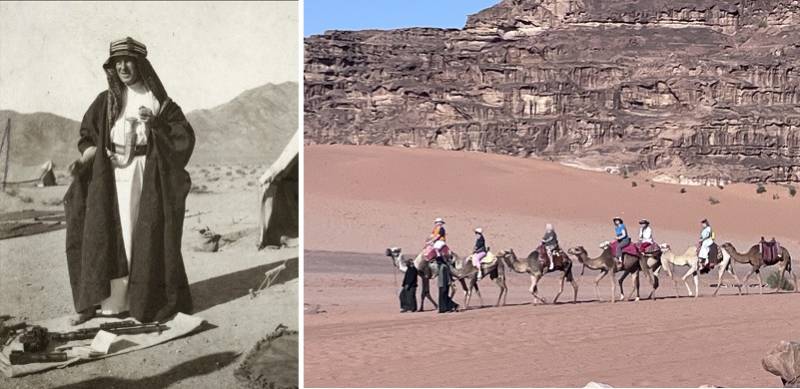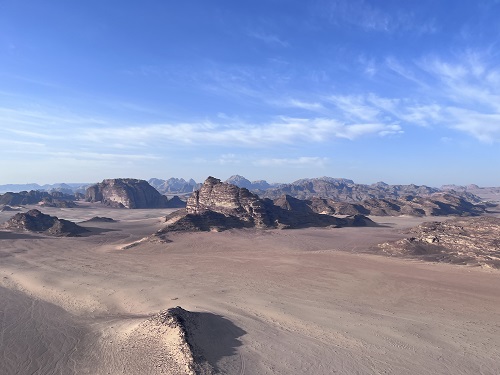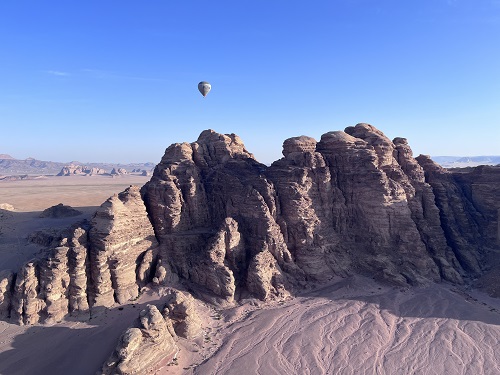
Wadi Rum – the very name echoes the sound of rippling sand and lurching camels. Recently, I spent time in Wadi Rum, located in the middle of the Jordanian desert and it was an otherworldly experience. The absence of greenery and the vast dry landscape afforded a different perspective to urban concrete. Its inaccessibility disconnected me from what was going on in the world – particularly without cell phone service or a laptop in sight. It is no wonder that this site has been used to depict other planets in movies like The Martian.
After a night under silent, starry skies – the only sounds were of fidgeting camels and tourists smoking shisha while gazing upward in amazement at the Milky Way – I woke up on my first morning in the Wadi rest camp to a desert landscape, its sand-coloured rocks juxtaposed against a vivid blue sky. I had not expected such a cool morning breeze. Alone with myself, I felt a complete calm, my senses heightened to sounds and smells. I could understand why 19th century explorers and travellers (like TE Lawrence) sought to escape from the hustle and bustle of Victorian England and seek refuge within the silence and sparse comfort of the desert, and within themselves.
 Even in a desolate desert, one is not far from history. Once, the Turks ruled over this part of the Levant. They built the Hejaz railway, connecting Damascus with Madinah. Inevitably, the name of T.E. Lawrence (aka Lawrence of Arabia) came up. A freedom fighter to the Arabs, a hero to the Jordanians, he is regarded as a traitor by the Turks. According to my Turkish colleague, the train sabotaged by Lawrence and his accomplices was actually captured by the Jordanians revolting against their Ottoman rulers. One man’s hero is another man’s traitor, which is not very different from modern-day politics in our part of the world.
Even in a desolate desert, one is not far from history. Once, the Turks ruled over this part of the Levant. They built the Hejaz railway, connecting Damascus with Madinah. Inevitably, the name of T.E. Lawrence (aka Lawrence of Arabia) came up. A freedom fighter to the Arabs, a hero to the Jordanians, he is regarded as a traitor by the Turks. According to my Turkish colleague, the train sabotaged by Lawrence and his accomplices was actually captured by the Jordanians revolting against their Ottoman rulers. One man’s hero is another man’s traitor, which is not very different from modern-day politics in our part of the world.
During this brief respite, I could not resist going down the rabbit hole of history. Why should Lawrence – an archetypal Briton – have mastered Arabic, lived like a Bedouin, and become more committed to their freedom than they themselves were? From his memoirs Seven Pillars of Wisdom, it is clear that it was more than an impulse to escape from modernity. It took years of superhuman patience and immense self-control for him to become himself.
TE Lawrence was a man of many parts –a full-time army officer, a part-time archaeologist, and interfering diplomat, and in his evening of his life, a masterly writer. To many since his untimely death in an avoidable motorcycle accident in May 1935, he has become a role model of a secular, un-worldly ascetic. One needs to read his lines many, many times to understand his mind: “All men dream; but not equally. Those who dream by night in the dusty recesses of their minds Awake to find that it was vanity; But the dreamers of day are dangerous men…”
Lawrence was never at peace with himself. On 6 May 1935, a few days before his death, Lawrence wrote to his friend Eric Kennington. He expressed his anxieties: “What I have done, what I am doing, what I am going to do, puzzle and bewilder me. Have you ever been a leaf and fallen from your tree in autumn and been really puzzled about it? That's the feeling.”
Which of us has not had the same feeling – the helplessness of a falling leaf?
Sitting in the desert at Wadi Rum, I had time to reassess my own life. I am a professional career woman. I am a caring mother. I like to write and paint and explore the world but find that I have little time for anything except to go through a never-ending list of to dos on a daily basis. I would like to do more volunteer work, teach at a university, learn calligraphy, mould pottery – and after this week in Wadi Rum, I would like to hide out in a desert cave for six months learning Arabic history and mingling with Bedouins and sleeping under the stars.
It seems such a far-off goal to be able to match T.E. Lawrence’s facility with the pen. I will certainly not be able to relive his life. I will never be able to write as he did:
You may often wonder as to what you are doing with your life. Well, so do many of us in truth. Days dawn, suns shine, evenings sink into night. I want to be more than part of that repetitive cycle that we subject ourselves to in the modern world, measuring our days through productive efficiency and endless objectives.
I want to leave my will across the sky and stars for my children and grandchildren to read.
After a night under silent, starry skies – the only sounds were of fidgeting camels and tourists smoking shisha while gazing upward in amazement at the Milky Way – I woke up on my first morning in the Wadi rest camp to a desert landscape, its sand-coloured rocks juxtaposed against a vivid blue sky. I had not expected such a cool morning breeze. Alone with myself, I felt a complete calm, my senses heightened to sounds and smells. I could understand why 19th century explorers and travellers (like TE Lawrence) sought to escape from the hustle and bustle of Victorian England and seek refuge within the silence and sparse comfort of the desert, and within themselves.
 Even in a desolate desert, one is not far from history. Once, the Turks ruled over this part of the Levant. They built the Hejaz railway, connecting Damascus with Madinah. Inevitably, the name of T.E. Lawrence (aka Lawrence of Arabia) came up. A freedom fighter to the Arabs, a hero to the Jordanians, he is regarded as a traitor by the Turks. According to my Turkish colleague, the train sabotaged by Lawrence and his accomplices was actually captured by the Jordanians revolting against their Ottoman rulers. One man’s hero is another man’s traitor, which is not very different from modern-day politics in our part of the world.
Even in a desolate desert, one is not far from history. Once, the Turks ruled over this part of the Levant. They built the Hejaz railway, connecting Damascus with Madinah. Inevitably, the name of T.E. Lawrence (aka Lawrence of Arabia) came up. A freedom fighter to the Arabs, a hero to the Jordanians, he is regarded as a traitor by the Turks. According to my Turkish colleague, the train sabotaged by Lawrence and his accomplices was actually captured by the Jordanians revolting against their Ottoman rulers. One man’s hero is another man’s traitor, which is not very different from modern-day politics in our part of the world.During this brief respite, I could not resist going down the rabbit hole of history. Why should Lawrence – an archetypal Briton – have mastered Arabic, lived like a Bedouin, and become more committed to their freedom than they themselves were? From his memoirs Seven Pillars of Wisdom, it is clear that it was more than an impulse to escape from modernity. It took years of superhuman patience and immense self-control for him to become himself.
TE Lawrence was a man of many parts –a full-time army officer, a part-time archaeologist, and interfering diplomat, and in his evening of his life, a masterly writer. To many since his untimely death in an avoidable motorcycle accident in May 1935, he has become a role model of a secular, un-worldly ascetic. One needs to read his lines many, many times to understand his mind: “All men dream; but not equally. Those who dream by night in the dusty recesses of their minds Awake to find that it was vanity; But the dreamers of day are dangerous men…”
Lawrence was never at peace with himself. On 6 May 1935, a few days before his death, Lawrence wrote to his friend Eric Kennington. He expressed his anxieties: “What I have done, what I am doing, what I am going to do, puzzle and bewilder me. Have you ever been a leaf and fallen from your tree in autumn and been really puzzled about it? That's the feeling.”
Which of us has not had the same feeling – the helplessness of a falling leaf?

Sitting in the desert at Wadi Rum, I had time to reassess my own life. I am a professional career woman. I am a caring mother. I like to write and paint and explore the world but find that I have little time for anything except to go through a never-ending list of to dos on a daily basis. I would like to do more volunteer work, teach at a university, learn calligraphy, mould pottery – and after this week in Wadi Rum, I would like to hide out in a desert cave for six months learning Arabic history and mingling with Bedouins and sleeping under the stars.
It seems such a far-off goal to be able to match T.E. Lawrence’s facility with the pen. I will certainly not be able to relive his life. I will never be able to write as he did:
“I drew these tides of
Men into my hands
And wrote my will across the
Sky and stars.”
You may often wonder as to what you are doing with your life. Well, so do many of us in truth. Days dawn, suns shine, evenings sink into night. I want to be more than part of that repetitive cycle that we subject ourselves to in the modern world, measuring our days through productive efficiency and endless objectives.
I want to leave my will across the sky and stars for my children and grandchildren to read.

